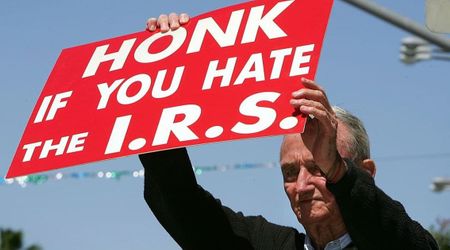Rare 'One Ring' Card From the 'Lord of the Rings' Card Game up for Bids at an Estimated $2 Million

The discovery of a rare and coveted One Ring card from the Lord of the Rings lore in Toronto, Canada has sparked a bidding war among collectors. The card, which is part of the 'Magic: The Gathering' card game is one of a kind and has attracted seven-figure bids, with one offer reaching two million euros ($2.2 million or 2.9 million Canadian dollars). However, if the ring bearer decides to sell the card, they may face a significant tax bill, potentially as high as 53.53%.
The quest for the One Ring card
The One Ring card is a promotional item released by Wizards of the Coast, the company behind the Magic card game. It is part of a Lord of the Rings-themed set and is the only one of its kind in existence, per CNBC. The card features traditional foil printing and is adorned with the Black Speech of Sauron using Tengwar letterforms. The odds of finding the card were roughly one in three million and hence its uniqueness has attracted considerable attention from collectors, resulting in bids reaching millions of dollars.

Gremio de Dragones, a game store based in Valencia, Spain offered 2 million euros, about $2.2 million or 2.9 million Canadian dollars for the card, per CNBC, and its bid included travel and lodging expenses and a free paella dinner. Dave & Adam’s, a collectibles shop near Buffalo, New York offered $1 million.
Tax implications in Canada
While lottery winnings are tax-free in Canada, profits from the sale of the One Ring card would generally be subject to tax. However, only half of the seller's profit will be taxable, thanks to Canada's inclusion rate system. In this scenario, the seller would likely be taxed at the top income tax rate, which is 53.53% in Ontario, where the card was found. Taking into account the inclusion rate, the effective tax rate on the transaction would be approximately 26.8%. Based on the current top bid of 2 million euros, the total tax bill could amount to around Canadian $780,000 or US $588,000.
An ambiguity of tax scenarios
Different taxation scenarios may apply depending on the circumstances of the acquisition and the seller's intent. If the card was accidentally dropped and found on the street, the inclusion rate would likely jump to 100%, resulting in the entire profit being taxed. Similarly, if the seller was operating a collectible store and the sale was considered a business transaction, all the profits could be subject to taxation. The Canada Revenue Agency has some discretion in determining the tax treatment, and certain factors such as the owner's efforts to maximize profit could influence their decision. The complexity of these scenarios makes the tax implications somewhat subjective.
View this post on Instagram
Capital gains tax in the United States
In the United States, capital gains tax treatment is based on the duration of asset ownership. Assets held for less than a year are considered 'short-term' and taxed at ordinary income tax rates, which can reach up to 37% at the federal level. Assets held for more than a year are classified as 'long-term' and receive preferential treatment. However, collectibles are subject to a higher top rate of 28% compared to the top rate of 20% for stocks. Additional net investment income taxes and state and local taxes may also apply.
View this post on Instagram
Comparing tax rates in Canada and the United States
From a tax perspective, the ring bearer would fare better in Canada than in the United States. With Canada's top income tax rate at 53.53% and an inclusion rate of 50%, the effective tax rate on the transaction would be approximately 26.8%. In the United States, the top rate for collectibles would be 28%, plus additional net investment income tax and state/local taxes. Thus, the potential tax liability in Canada seems comparatively lower.























